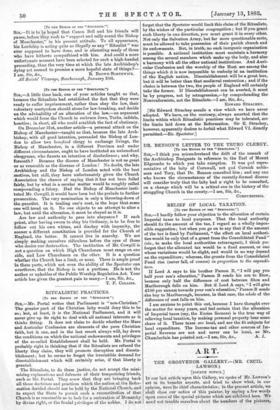RELIEF OF LOCAL TAXATION.
[To THE EDITOR OF THE " SPECTATOR."1
SIR,—I hardly follow your objection to the allocation of certain. Imperial taxes to local purposes. That the local authority should fix the amount of the tax, I regard as a wholly impos- sible suggestion; but when you go on to say that if the amount of the tax is fixed by Parliament, " the effect on local authori- ties would be only that of a grant from the Consolidated Fund" (viz., to make the local authorities extravagant), I think yor forget that the allocated tax would be a fixed amount, or one whose variations would be slight, and would in no way depend on the expenditure ; whereas, the grants from the Consolidated. Fund rise (never fall, of course) in proportion to the expendi- ture.
If Lord A says to his brother Parson B, "I will pay you half your son's education," Parson B sends his son to Eton,. because only half the difference of cost between Eton and Marlborough falls on him. But if Lord A says, I will give• £100 per annum towards your son's education," Parson B sends -the boy to Marlborough, because, in that case, the whole of the difference of cost falls on him.
I am anxious to point this out, because I have thought over the matter for many years, and feel certain that the allocation of Imperial taxes (say, the Excise licences) is the true way of relieving local taxation, by making personal property bear some share of it. These taxes are local, and are the fit subjects for local expenditure. The Income.tai and other sources of Im- perial Revenue are not and never can be local, as Mrs Chamberlain has pointed out.—I am, Sir, A. J.


































 Previous page
Previous page